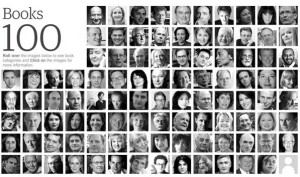When the Guardian and Observer first drew up their list of the publishing Top 50 in 2006, Richard and Judy Book Club creator Amanda Ross hit the top slot. The R&J format, based on Oprah Winfrey’s book club in the US, revolutionised the publishing industry, with their impact well documented across the publishing world. At the time, a title’s success often hung on the recommendation of these two TV celebrities, who spawned such stars as The Lovely Bones, My Sister’s Keeper, and The Cloud Atlas.
All change for the 2011 Power 100 list. Over the last five years, the digital revolution has totally changed the publishing landscape. Jeff Bezos, founder and CEO of Amazon, has the dubious honour of being named number one, with Larry Page (Google CEO) and Tim Cook (Apple) also occupying prestigious ranks (3 and 10). JK Rowling is straight in at number two, with the launch of her new Pottermore website due for early 2012. More than a fansite, Pottermore aims to deliver interactive reader experiences, and has, indeed, been shaped and re-designed based on the feedback of Beta users. What really strikes me about this is the way that Rowling has capitalised on the seemingly insatiable appetite of Potter fans worldwide for MORE. More content, more experience, and more involvement in the Potter world.
Which leads me to Number 100. A new entry. One of the most powerful players in the publishing industry to emerge in the last few years. You. No longer is the power monopolised by commissioning editors or even TV personalities. Through Facebook, Twitter, blogs, and online forums, it’s the readers who are deciding what’s worth reading, and, even more alarmingly, sharing their opinions with their friends, fans, and followers in a way that’s impossible to control or even predict. Book reviews are no longer confined to the opinions of so-called (and questionably-incentivised) experts, tucked away in specialist columns or publications. We trust the judgement of our peers, not what some retailer tells us we want, and can choose from a seemingly infinite selection of titles: frontlisters, backlisters, big hitters and hidden gems. We’re no longer satisfied with the one-size-fits-the-target-market method of publishing: we want an individual, tailor-made reading experience. And we want to talk about it. We’ll blog, tweet, rant on forums and tell the world through status updates. We’ll always have something to say.
And we’re not just talking about books. At time of writing the List has 144 associated tweets, 212 Facebook recommendations, and a comment stream that reads like an angry battle-of-the-bibliophiles. It doesn’t matter how much time, research, and discussion went into its compilation, every reader has an opinion, and an avenue through which to voice it. We won’t be told what to read/buy/think, and we’re not afraid to show it.
We’re the children of the digital revolution. And you won’t fool us.
